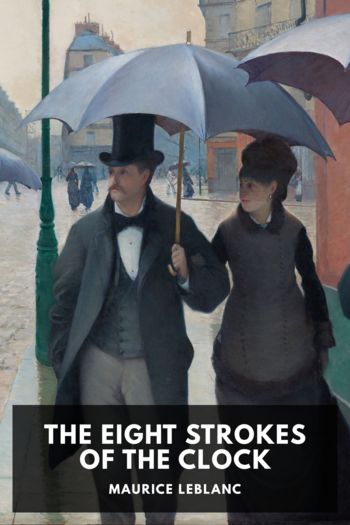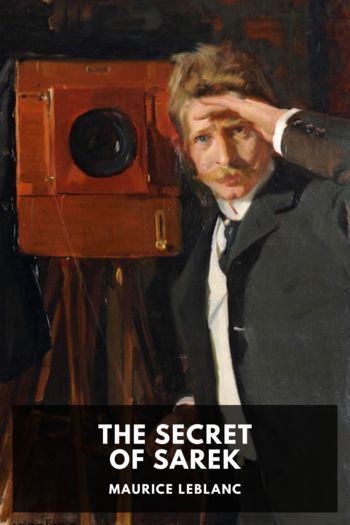The Eight Strokes of the Clock - Maurice Leblanc (reading in the dark .TXT) 📗

- Author: Maurice Leblanc
Book online «The Eight Strokes of the Clock - Maurice Leblanc (reading in the dark .TXT) 📗». Author Maurice Leblanc
By Tuesday evening he was no further advanced than on the Saturday. The darkness was as dense as ever. He had not discovered the smallest clue for his guidance, nor could he see the slightest reason to hope.
At times, notwithstanding his immense power of self-control and his unlimited confidence in the resources at his disposal, at times he would quake with anguish. Would he arrive in time? There was no reason why he should see more clearly during the last few days than during those which had already elapsed. And this meant that Hortense Daniel would inevitably be murdered.
The thought tortured him. He was attached to Hortense by a much stronger and deeper feeling than the appearance of the relations between them would have led an onlooker to believe. The curiosity at the beginning, the first desire, the impulse to protect Hortense, to distract her, to inspire her with a relish for existence: all this had simply turned to love. Neither of them was aware of it, because they barely saw each other save at critical times when they were occupied with the adventures of others and not with their own. But, at the first onslaught of danger, Rénine realized the place which Hortense had taken in his life and he was in despair at knowing her to be a prisoner and a martyr and at being unable to save her.
He spent a feverish, agitated night, turning the case over and over from every point of view. The Wednesday morning was also a terrible time for him. He was losing ground. Giving up his hermit-like seclusion, he threw open the windows and paced to and fro through his rooms, ran out into the street and came in again, as though fleeing before the thought that obsessed him:
“Hortense is suffering. … Hortense is in the depths. … She sees the hatchet. … She is calling to me. … She is entreating me. … And I can do nothing. …”
It was at five o’clock in the afternoon that, on examining the list of the six names, he received that little inward shock which is a sort of signal of the truth that is being sought for. A light shot through his mind. It was not, to be sure, that brilliant light in which every detail is made plain, but it was enough to tell him in which direction to move.
His plan of campaign was formed at once. He sent Adolphe, his chauffeur, to the principal newspapers, with a few lines which were to appear in type among the next morning’s advertisements. Adolphe was also told to go to the laundry at Courbevoie, where Mlle. Covereau, the second of the six victims, had been employed.
On the Thursday, Rénine did not stir out of doors. In the afternoon, he received several letters in reply to his advertisement. Then two telegrams arrived. Lastly, at three o’clock, there came a pneumatic letter, bearing the Trocadéro postmark, which seemed to be what he was expecting.
He turned up a directory, noted an address—“M. de Lourtier-Vaneau, retired colonial governor, 47 bis, Avenue Kléber”—and ran down to his car:
“Adolphe, 47 bis, Avenue Kléber.”
He was shown into a large study furnished with magnificent bookcases containing old volumes in costly bindings. M. de Lourtier-Vaneau was a man still in the prime of life, wearing a slightly grizzled beard and, by his affable manners and genuine distinction, commanding confidence and liking.
“M. de Lourtier,” said Rénine, “I have ventured to call on your excellency because I read in last year’s newspapers that you used to know one of the victims of the lady with the hatchet, Honorine Vernisset.”
“Why, of course we knew her!” cried M. de Lourtier. “My wife used to employ her as a dressmaker by the day. Poor girl!”
“M. de Lourtier, a lady of my acquaintance has disappeared as the other six victims disappeared.”
“What!” exclaimed M. de Lourtier, with a start. “But I have followed the newspapers carefully. There was nothing on the 18th of October.”
“Yes, a woman of whom I am very fond, Madame Hortense Daniel, was abducted on the 17th of October.”
“And this is the 22nd!”
“Yes; and the murder will be committed on the 24th.”
“Horrible! Horrible! It must be prevented at all costs. …”
“And I shall perhaps succeed in preventing it, with your excellency’s assistance.”
“But have you been to the police?”
“No. We are faced by mysteries which are, so to speak, absolute and compact, which offer no gap through which the keenest eyes can see and which it is useless to hope to clear up by ordinary methods, such as inspection of the scenes of the crimes, police enquiries, searching for fingerprints and so on. As none of those proceedings served any good purpose in the previous cases, it would be waste of time to resort to them in a seventh, similar case. An enemy who displays such skill and subtlety would not leave behind her any of those clumsy traces which are the first things that a professional detective seizes upon.”
“Then what have you done?”
“Before taking any action, I have reflected. I gave four days to thinking the matter over.”
M. de Lourtier-Vaneau examined his visitor closely and, with a touch of irony, asked:
“And the result of your meditations … ?”
“To begin with,” said Rénine, refusing to be put out of countenance, “I have submitted all these cases to a comprehensive survey, which hitherto no one else had done. This enabled me to discover their general meaning, to put aside all the tangle of embarrassing theories and, since no one was able to agree as to the motives of all this filthy business, to attribute it to the only class of persons capable of it.”
“That is to say?”
“Lunatics, your excellency.”
M. de Lourtier-Vaneau started:
“Lunatics? What an idea!”
“M. de Lourtier, the woman known as the lady with the hatchet is a madwoman.”
“But she would be locked up!”
“We don’t know that





Comments (0)